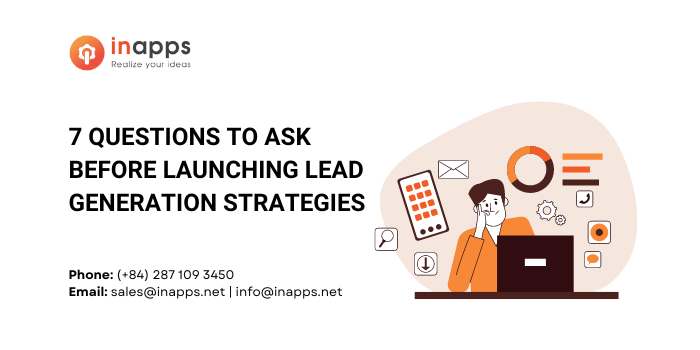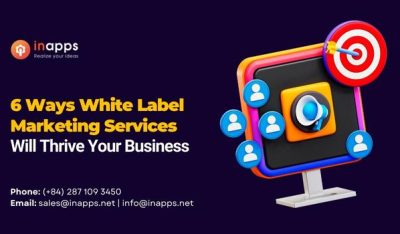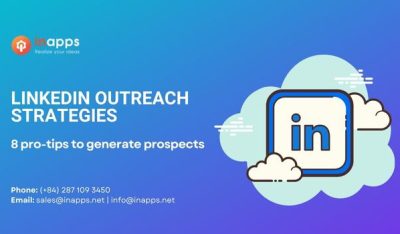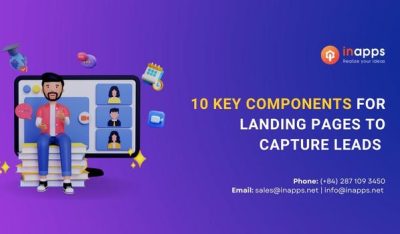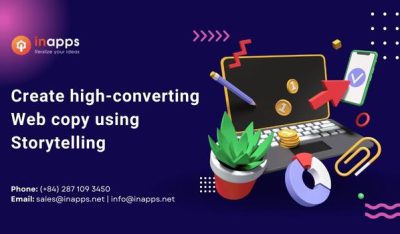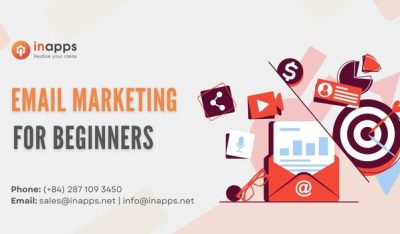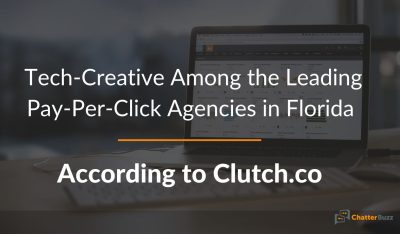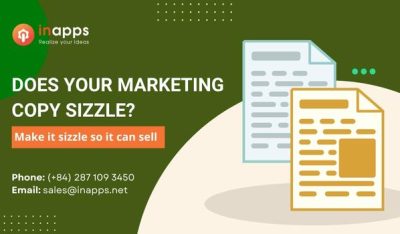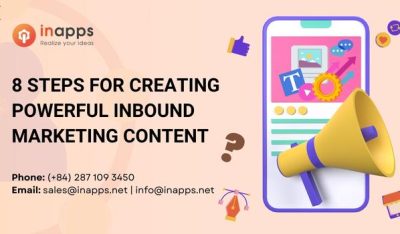- Home
- >
- Inbound Marketing
- >
- 7 Questions to ask before launching Lead Generation strategies
7 Questions We Ask Before Launching Any Lead Generation Strategies is an article sent to you by the InApps editorial team. Hope readers will have more useful knowledge at www.inapps.net
There’s a particularly common mistake I see companies make with their lead generation strategies:
They tend to over-focus on the creative aspect of lead generation – creating landing pages, setting up calls to action or running A/B tests.
And in the process, they forget about the most important element – developing a strong foundation for their strategy.
And look, it’s not just my impression. As it turns out, according to BrightTalk research, 80% of marketers consider their lead generation efforts as only slightly or somewhat effective. (source)
Mind-boggling, isn’t it?
But what’s even more unbelievable is that building that foundation is as simple as asking few specific questions.
That’s exactly what we do with every new client.
And in this post, I want to show you the 7 questions we always ask before sitting down to design our clients’ lead generation strategies.
Ready? Then let’s take it from the top.
Why Marketers Struggle with Launching Lead Generation Strategies
As I alluded to above, the answer to this question becomes even clearer when you look at the findings of a survey conducted by ITSMA and the Rain Group.
As their research discovered, the number 1 lead generation challenge marketers face is…designing the actual strategy.
Here, take a look:

(image source)
42% of 845 companies surveyed admitted to struggling to find a strategy or tactic that would generate leads.
(And what’s important to notice is that 31% of them also acknowledged they have no idea how to document it, and then measure their progress.)
As a result, in spite of their efforts, companies find it hard to generate high-quality leads.
This is precisely what a report by LeadG2 found:
Generating high-quality leads was the highest rated challenge among the surveyed marketers.

(image source)
But why is this such a big problem?
For one thing, because as Brad Bortone, the Associate Editor at Marketing Sherpa, points out:
“Marketers rely more on creativity than process.”
As I mentioned in the opening of this article, they tend to focus on the creative aspects (which I admit are much cooler to talk about than the strategy itself) — creating landing pages, running Google ads, testing calls to action …
But let’s face it, useful as these activities are, they rarely deliver results by themselves.
For that to happen, you need first to build a solid basis for your lead generation strategy.
And to make that easier for you, I decided to share with you some questions we ask our clients before even sitting down to decide how we’re going to deliver leads.
So, without any further ado, here are the 7 questions we ask before launching any lead generation strategy.
Question #1: What is your sales process (and at what point do you want to generate leads)?
I’m sure you know this already:
You can generate leads at every stage of the buying cycle.

(image source)
But the quality of those leads and strategies you’d need to use will greatly differ between each stage.
For example, people who are in the two early stages typically aren’t ready to buy yet. They’re more interested in learning more about their problem, rather than discovering potential solutions.
As a result, these leads might respond better to top of the funnel lead magnets and will need more nurturing before they become sales-ready.
However, someone who’s already evaluating products to buy or has reached a buying decision will be the most likely to talk to your sales force.
But why is answering this question so important? Because to generate and convert leads, you need to have a system in place that matches your current sales process.
For example, if you typically forward all leads to sales people, you should only focus on targeting people deeper in the buying cycle.
But if you have the infrastructure and ability to create assets that would nurture cold leads, then you might consider targeting the top of the funnel.
Use our Digital Marketing Calculator to determine which part of the funnel you would like to marketDOWNLOAD NOW
Question #2: How Do You Assess the Quality of Your Leads?
Or, in other words, how do you decide that lead is ready to be passed on to sales?
As I mentioned above, not every lead is ready to talk to a salesperson when they join your list. But by nurturing them, you can guide them to that stage.
The problem? To hand them over to sales, you need to know what a sales qualified lead (SQL) looks like.
Without it, you might miss out on many potential business opportunities. Or aggravate other leads by passing them to the sales team too early.
Question #3: How are you going to nurture and process the leads we’re going to generate?
Do you have the infrastructure to manage and convert those people into viable business opportunities?
Even a simple process of calling sales qualified leads within a day of them joining your list would suffice.
The key thing is to have a process that you will follow. Otherwise, all your lead generation efforts will simply be in vain.
Why is this important? Because as research by Marketing Sherpa showed (cited via Hubspot) (note, the emphasis in bold and underline is mine):
“79% of marketing leads never convert into sales. Lack of lead nurturing is the common cause of this poor performance.”
Question #4: Do you know how to reach your target market?
I agree. Typically, identifying channels to market lies with anyone who designs your strategy.
Nonetheless, we ask this question in order to understand the personality of your target market. Specifically, we try to uncover:
- Where do they typically hang out online?
- What websites or forums do they frequent?
- How do they search for information?
But why is knowing this is so important? Because with this insight, you can tailor any lead generation campaign to ensure that your audience receives the right message at the right time, and as a result, acts on it, converting it into leads.
Question #5: What are your audience’s biggest pain points?
You know:
Unless you fully understand what motivates or keeps the people you want to attract to your business up at night, you’re going to struggle to convert them into leads.
But I’m always surprised at how many marketers don’t realize what specific pain points their solutions help to overcome.
In my previous post, I quoted various research findings confirming that knowing your customer’s pain points is one of the key factors that can make your strategy a success. (And if you’ve missed it, you can check the post here).
But just to give you one example: Last year, research by Cintell called “Understanding B2B Buyers” discovered that:
- 71% of companies that exceed revenue and lead goals have documented buyer personas vs. 37% that simply meet goals and 26% that miss them.

(image source – the Cintell report)
And do you know why that is? Because they fully understand what value they deliver to their clients, and then tailor their efforts to communicate it, ultimately attracting more people to their brand.
Question #6: What do you want your customers to do after they’ve purchased from you?
When it comes to lead generation, it pays to begin with the end in mind.
Knowing the post-purchase action, you want customers to take actions that will help you put the lead generation strategy in the context of your entire customer journey.
For example, if you’re looking for more publicity and would like your customers to talk about you on social media, then you need to create a campaign that’s going to wow them every step of the way.
Achieving this would include creating useful lead magnets that help customers overcome their pain points, writing engaging welcome emails, and finally, providing above average customer service.
Question #7: What’s your USP? What would make someone choose you over someone else?
Finally, when deciding how you’re going to generate leads, you also need to look at your unique selling proposition.
Your USP tells someone why they should buy your product or hire your company over the competitor.
And you should communicate it right from the start of the customer journey to immediately differentiate your business.
Let me demonstrate this with an example. Let’s imagine that you decide to run an Adwords campaign aimed at generating new leads. Given the amount of competition for the most popular keywords, you really need to include something in your ad that will make it stand out – your USP.
Take a look.
This company offers a flat support rate in NYC. And naturally, they use it to draw attention to their ads.
Wrapping Up
I shared these questions for one reason — to help you avoid making the most common lead generation mistake of over-focusing on the creative aspects of the strategy and forgetting about building its foundation.
Hopefully, now, you know what information you need to gather before moving to building landing pages or calls to action that would help you generate leads.
Good luck!
Follow this to make sure you’ve got 7 Questions We Ask Before Launching Any Lead Generation Strategies. Save and share with those around you these extras.
To learn more about Inbound Marketing
Contact us:
www.inapps.net
List of Keywords users find our article on Google
[sociallocker id=”2721″]
| lead generation questions |
| lead generation question |
| questions for lead generation |
| lead generation strategies |
| lead generation |
| questions to ask before choosing a lead generation company |
| lead gen questions |
| lead generation questionnaire |
| any lead |
| questions to ask a lead generation company |
| “usp blog” |
| some lead |
| hope is not a strategy |
| “inbound marketing” |
| lead generation strategies in digital marketing |
| questions to ask a lead generation client |
| “seo ab testing” |
| anylead |
| questions to ask lead generation companies |
| inbound marketing |
[/sociallocker]
Let’s create the next big thing together!
Coming together is a beginning. Keeping together is progress. Working together is success.




